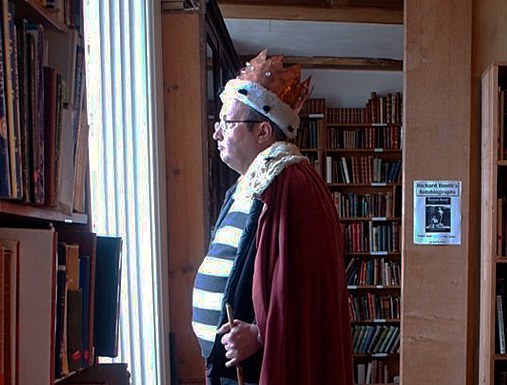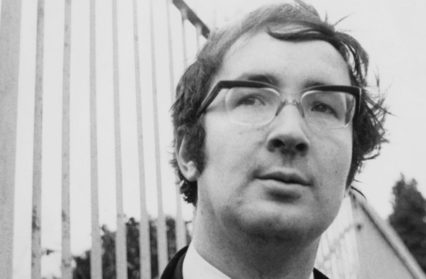Oliver Balch pays tribute to eccentric bookshop owner and self-proclaimed King of Hay-on-Wye, Richard Booth.
“The King is Dead. Long Live the Kingdom.” So rang the cry across the border town of Hay-on-Wye last week in response to the sad news of Richard Booth’s passing. Legendary bookseller, self-styled monarch, and life-long bon-viveur, Richard died on Monday 19 August at the age of 80.
A British eccentric of the finest and most authentic kind, Richard Booth turned this small Powys market town into the world’s second-hand bookselling capital. In doing so, he created a lucrative year-round tourist trade as well as the foundations for the world-famous Hay Festival of Literature and Arts.
As a fabled raconteur, Richard was never too big on facts. His autobiography, My Kingdom of Books, is a characteristically sprawling affair, brimming with anecdote and opinion, but nothing as mundane as a chronology or index. I interviewed him numerous times in his later years and soon learned not to probe for specific dates or names. Such answers require an ordered (ordinary?) way of thinking: Richard’s mind, in contrast, leapt and danced.
But here, in brief, are basic facts as they stand. The son of Philip Booth, an officer in the British Army, Richard was born in Plymouth where his father was stationed at the time. His mother, Elizabeth Pitt, was an heiress of the Yardley (i.e. soap) family. He moved to the Welsh borders as a child after his father inherited the Brynmelyn estate in Cusop, just outside Hay-on-Wye. Later in life, after his parents’ death and in the wake of a major fire in 1977 at Hay Castle (his then residence), Richard also made his home in Cusop.
Educated at Rugby school, he went up to Merton College, Oxford, to read history during the late 1950s. After a very short spell in the City, he moved back to Hay-on-Wye and set up his first bookshop called The Old Fire Station in 1962. He went on to establish more than half-a-dozen shops over the follow decades. In the mid-1980s, he consolidated his operations in a flagship store, the eponymous and charmingly disorganised Richard Booth’s Bookshop.
The event for which Richard will always be best remembered occurred in April 1977, when he famously declared his adopted hometown a sovereign independent state. Naturally, he made himself king. Less naturally, perhaps, he appointed his horse as prime minister (although he claimed precedent in the figure of Caligula, who had made his beloved horse, Incitatus, a consul).
Ever one with an eye to publicity, Richard timed his famous self-coronation for April Fools’ day. Legend has it that the whole affair was sparked by a bet in the pub with two visiting journalists. True or not, the stunt worked. Within days, news of Hay’s upstart king had spread around the world, with articles appearing everywhere from Spain’s El Paísto The New York Times.

Richard was never shy of attention. Nothing would have made him happier than to know that his life had inspired a Thought for the Daymusing on Radio 4 last week (Bishop Graham Jones: “Among the eccentrics, we may find the most stimulating and transformative of people and ideas”). In equal measure, being overlooked infuriated him. I recall him once ranting about a profile of him in the Western Mail. The article, which filled an entire page, referred to him as the distinctly non-regal “Mr Booth” and had the temerity to describe a fellow bookseller as the “upstart prince”.
This mix of egoist and entertainer, humourist and herald, shines out from this short extract of a letter he once sent me via Patricia Daly, his loyal secretary for many years:
“. . . I feel that I should demean myself as no Royal person has ever done before and make myself Chairman of the Wales Tourist Board, because, having handled thousands of books on Wales, met hundreds of experts and spent fifty years travelling around the country, I am far better qualified than any official candidate …”
He never got the chairmanship, but, as he liked to remind anyone who cared to listen, he did win the honour of becoming Wales’ official tourist attraction in 1976. Nearly three decades later, in 2004, he went on to be awarded the MBE for his services to Welsh tourism.
Richard’s chasing of the spotlight represented more than just an exercise in self-promotion. His love for Hay-on-Wye was deep and genuine. The more his star shone, he liked to argue, the more the town’s own star would also shine. Long before talk of “mass marketing” or “unique selling points”, Richard saw that media exposure was gold-dust for a quiet, rural town like Hay-on-Wye.
And he was right. Over the years, the town has carved out a lucrative tourist niche for itself as a quirky, book-besotted town on the edge of the beautiful Brecon Beacons. While the number of bookshops might have slipped slightly in recent years (from a high of over 30 to just below 20 today), Richard’s vision of a vibrant, local economy free of big-brand ties is still very much alive. The UK’s only dedicated poetry bookshop recently ploughed a small fortune into a spanking new premises slap bang in the centre of Hay-on-Wye, for example. Where but in this independent bibliophile kingdom would such a high-risk, life-affirming venture ever take root?
As well as winning tourists, Richard’s anarchic spirit and incorrigible sense of fun also attracted a wave of like-minded settlers. These newcomers made superb courtiers, rejoicing in the king’s whims and celebrating his eccentricities. The more bonkers, the better. Many worked for him, most humoured him, and almost all were wined and (if they were lucky) dined by him.
Richard absolutely loved parties and, as owner of Hay Castle for more than a decade, he had the perfect venue to indulge his passion. In the 1960s and 1970s, the castle’s halls frequently reverberated with the sound of revelry and merrymaking. Richard’s get-togethers were notoriously last-minute affairs. They were also resolutely open-door. Richard enjoyed being with people – and with people who were enjoying themselves all the more. At his parties, foreign ambassadors would rub shoulders with Welsh radicals; London celebrities (Marianne Faithful and April Ashley were both regulars) with local farmers.
Stories, true and less-true, abound about Richard. Like his habit of driving around in a Rolls Royce piled high with books. Or his Cabinet’s use of a game board-style wheel to make policy decisions (options included ‘have a drink’, ‘defer to next session’, and ‘chop off her head’). Or his chairmanship of the not-so-Secret Service (known as ‘C.I.Hay’), which was designed to infiltrate the quangos, councils and other bastions of bureaucracy that he loathed with a passion.
Even at the end of his life, his enthusiasm for jokes and japes remained undimmed. Typical was the recent announcement by royal missive of the University of Cusop Dingle. Faculty could choose their own titles (the ‘Uri Gagarin Chair of Space Poetics’ was cited by way of inspiration), lectures would be given in the pub, and ‘Send in the Clowns’ was selected as the official anthem.
The university’s inaugural lecture, given by Tim the Gardener, an autodidact classicist, was entitled ‘Was Homer Taking the Mickey?’. The king followed up in his inimitable style, with a rambling speech about ‘Making A Purse from a Sow’s Ear’. The promised purse never emerged, but plenty of curious questions were asked and many rabbit holes explored.
Richard’s legacy in Hay-on-Wye is unquestionable. He set the town apart and made it what it is. If the town is to continue to grow and prosper now that the king is gone, then keeping true to his unorthodox, inventive way of seeing the world is by far its best chance.
But the impact of Richard’s life is not limited to this corner of the Welsh Marches. In a world of increasing uniformity and corporatized homogeneity, the idea that a maverick bookseller in a tiny Welsh town can stick two fingers up to the powers-that-be and declare himself king provides a continual source of hope and wonder for us all.
Richard’s life is the stuff of fable and myth, to be repeated – and, very possibly, embellished – around hearths and campfires for generations to come. “The King is Dead. Long Live the Kingdom.”
Richard George William Pitt Booth, bookseller, born 12 September 1938; died 19 August 2019. He is survived by his third wife Hope and two of his three sisters, Joanna and Anne.
His autobiography, ‘My Kingdom of Books’, was published in 1999 by the Aberystwyth-based publishing house, Y Lolfa.
From the Hay National Anthem
“Men of Scotland, Ireland, Brittany and Wales
Tell us your booktown tales,
All of us are true rural Celts,
Wear some braces as well as belts.”
Wales Arts Review’s News Service is supported by:












